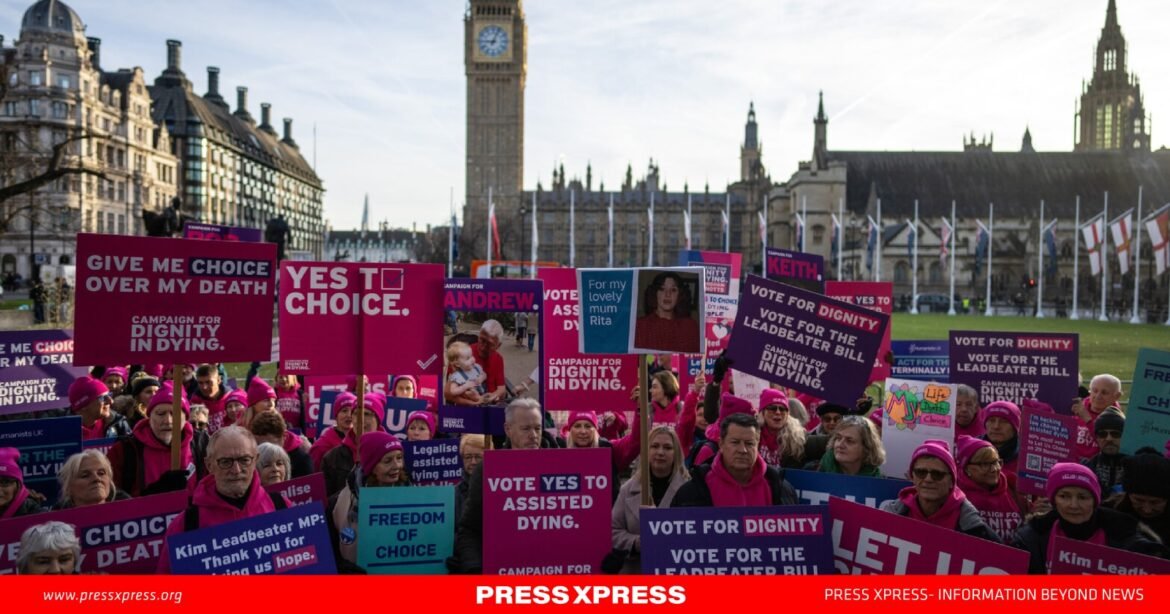Assisted dying could pressure vulnerable groups, including the elderly and disabled, into ending their lives
In a landmark decision, MPs in England and Wales have voted in favor of legalizing assisted dying for terminally ill adults expected to die within six months. The vote, held after an emotional debate in the House of Commons, saw 330 MPs supporting the bill against 275, a majority of 55. This marks the first significant step towards changing assisted dying laws in nearly a decade.
The bill, introduced by Labour MP Kim Leadbeater, aims to provide terminally ill individuals with the choice to seek medical assistance in ending their lives. Supporters gathered outside Parliament to celebrate, with campaign group Dignity in Dying calling the vote a “historic step towards greater choice and protection for dying people.”
Debate Highlights
The Commons debate was deeply personal, with MPs sharing stories of loved ones experiencing unbearable suffering in their final days. Opening the discussion, Leadbeater stated that the current laws were “failing” and that people deserved the right to “die with dignity.” She recounted harrowing cases of terminally ill individuals dying in pain, unable to access relief under the existing system.
Opponents, however, expressed concerns about the potential for abuse. Conservative MP Danny Kruger warned that vulnerable groups, including the elderly and disabled, could feel pressured to end their lives. Labour MP Diane Abbott echoed these fears, arguing that safeguards in the bill might not be robust enough to prevent coercion.

Key Provisions and Safeguards
The Terminally Ill Adults (End of Life) Bill includes stringent eligibility criteria:
Applicants must be mentally capable of making an informed decision.
Two independent doctors and a High Court judge must confirm the individual’s eligibility.
The decision must be voluntary, free from any coercion.
Leadbeater emphasized that these safeguards represent “the strongest protections in the world.” However, critics remain skeptical, with some describing the role of the judge as potentially a “rubber stamp.”


A Divided House
The vote was a free one, allowing MPs to decide based on conscience rather than party lines. Prime Minister Keir Starmer and Conservative leader Rishi Sunak both supported the bill, while Tory leader Kemi Badenoch voted against it. Cabinet members were also divided: 15 supported the bill, including Chancellor Rachel Reeves, while eight, including Health Secretary Wes Streeting, opposed it.
Data from the vote revealed gender disparities in support, with 55% of female MPs favoring the bill compared to 49% of male MPs. Labour provided the most support, with 234 MPs voting in favor.

Public and Global Perspectives
The debate has sparked significant public interest, with opinion polls consistently showing widespread support for assisted dying among the general population. Campaigners like Dame Esther Rantzen, who has terminal lung cancer, praised the vote, stating it could spare future generations the suffering endured by many today. “This may come too late for me,” she said, “but it will bring relief to others.”
Opponents, including religious groups and disability rights advocates, have raised moral and ethical concerns, arguing that the focus should instead be on improving palliative care.
Internationally, the vote aligns with trends in countries such as Canada, Belgium, and the Netherlands, where assisted dying is legal under strict conditions. Scotland is also considering a similar bill, which could be voted on next year.
Next Steps?
The bill faces numerous hurdles before becoming law. It will undergo further scrutiny in both Houses of Parliament, with opportunities for amendments. The government, which has adopted a neutral stance, has pledged to ensure the bill’s effectiveness if it passes.
The outcome of this historic vote has set the stage for a prolonged and deeply emotional debate on one of the most contentious ethical issues of our time. For supporters, it represents a step towards dignity and choice at the end of life; for critics, it raises profound questions about safeguarding vulnerable individuals. As the process continues, the future of assisted dying in England and Wales hangs in the balance.


